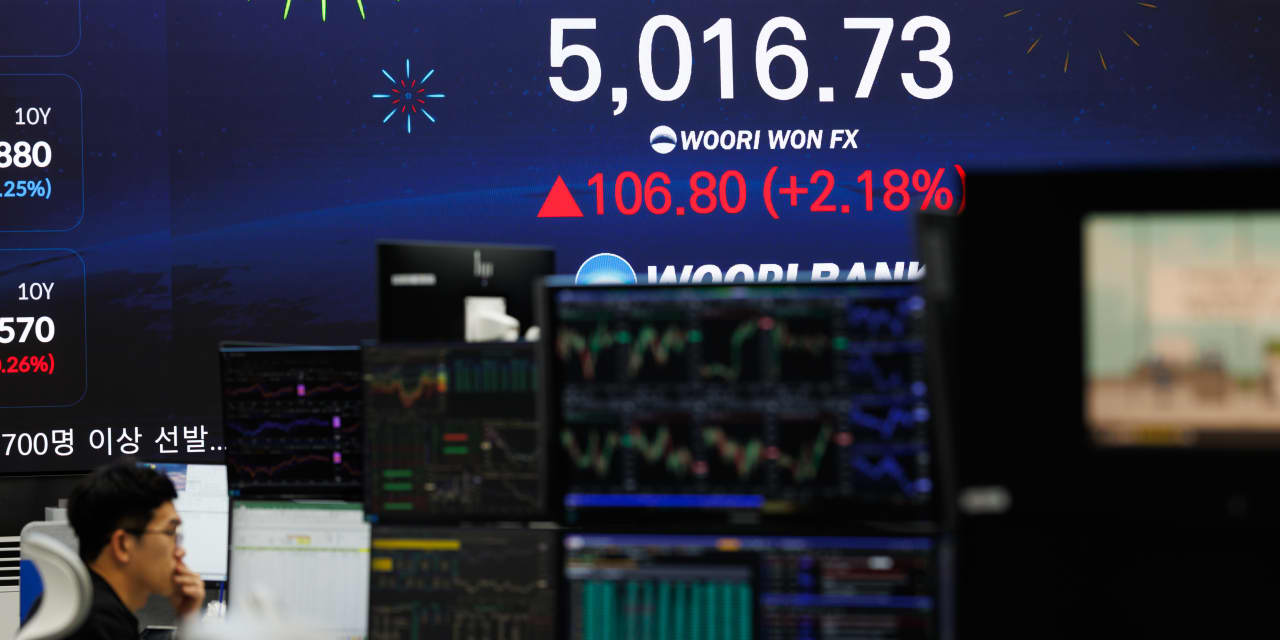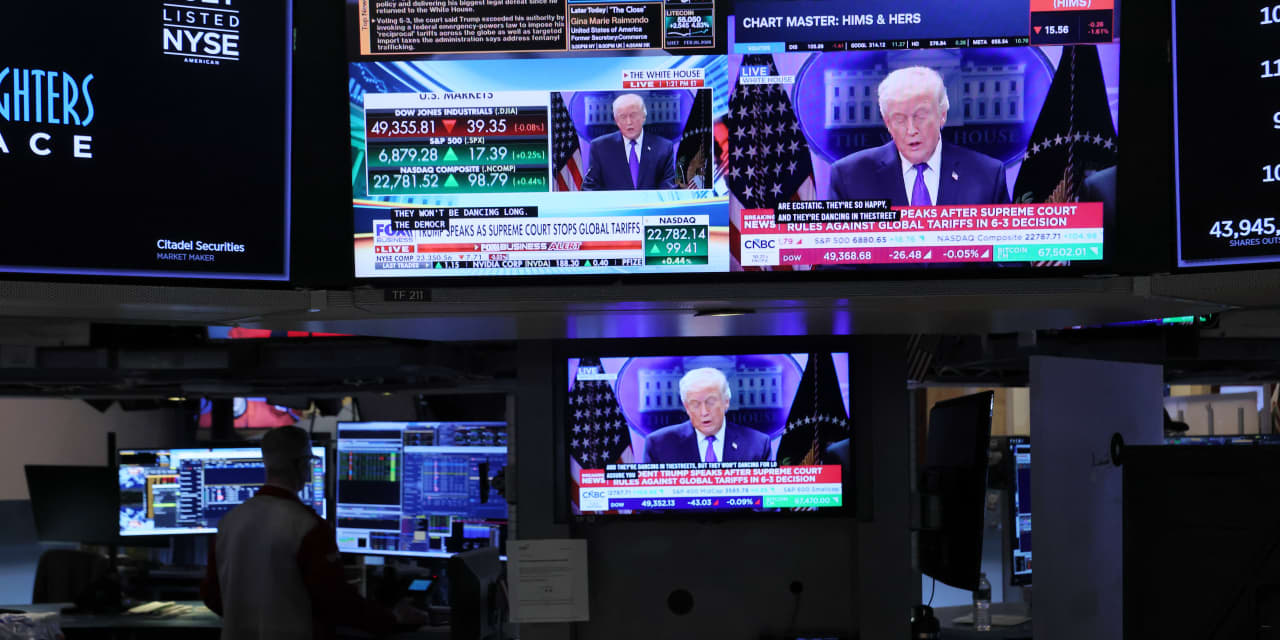While the hype hit new heights over the past year, artificial intelligence (AI) has been around for a while and the enthusiasm is here to stay. Bloomberg Intelligence (BI) estimates that the generative AI market could grow 40%-plus annually and reach $1.2 trillion by 2032. That level of growth will also create an estimated $280 billion in new revenue opportunities from software alone.
Emerging new industries are exciting, but picking the long-term winners can be challenging. For all investors know, the most prolific company of the next 20 years might not even exist yet. That suggests casting a wide net could be the best investment strategy. In this case, the best approach might be to find the early winners, own their stocks, and follow how AI progresses over time.
After pouring through dozens of companies, these five stood out for their strong positions to lead the industry’s growth. Consider buying and holding these AI stocks. They enjoy pole positions in the AI industry and could generate life-changing investment returns over the next decade and beyond.
1. Nvidia: This company owns an estimated 90% of the AI chip market
Artificial intelligence (AI) might seem like it became Wall Street’s hottest trend overnight. Seemingly just as quickly, graphics chip company Nvidia (NASDAQ: NVDA) has taken a stranglehold on the market for chips used to power AI models (it controls as much as 90% of the market). One of its competitors, Advanced Micro Devices, estimates the AI chip market will grow to $400 billion over the next several years. Do the math, and Nvidia’s companywide revenue of $45 billion over the past year looks poised to skyrocket.
The competition will chase Nvidia, but the company’s high-performance chips, combined with its popular CUDA computing software optimized to get the most out of them, create a turnkey package the industry keeps opting for. Perhaps Nvidia’s competitors weren’t ready for the AI surge. Shares have gained over 230% this past year alone, but the long-term demand for AI chips seems poised to drive the stock even higher as Nvidia grows.
2. ASML: Manufacturing cutting-edge chips relies on this one manufacturer
Ironically, most chip companies, including Nvidia, don’t build their chips. They only design them. Chip factories, called fabs, do the building and require cutting-edge machines to make intricate patterns on silicon wafers. ASML (NASDAQ: ASML) designs and builds extreme ultraviolet lithography (EUV) machines, which are used to create the most advanced chips hitting the market today.
Remarkably, ASML is the only company that makes this type of machine. This machine is so complex that it takes 13 shipping containers and 250 crates to ship and costs up to $400 million each. Naturally, AI and general technology will continue progressing. Breakthroughs will require increasingly better machines to make better chips. ASML should be a long-term beneficiary of the AI boom.
3. Palantir: Enterprises are flocking to use this company’s custom software applications
Big technology companies are spending to build advanced computer systems, but smaller enterprises want to use AI technology to help run their businesses. Because of this, Palantir Technologies (NYSE: PLTR) is seeing growth take off. The company sells custom software applications built on three proprietary platforms: Gotham, Foundry, and AIP. Specifically, AIP was designed for building and deploying AI in commercial applications.
Palantir gets over half its revenue from government customers, the U.S. government being its largest and oldest customer. However, the commercial segment is thriving. Palantir’s enterprise customer base grew 55% year over year in the fourth quarter and 22% over the previous three months to 221. That’s just a couple of hundred companies in a broader corporate landscape of millions. If companies worldwide need AI to compete, Palantir could grow for years.
4. Supermicro: Turnkey server systems are in high demand, and this company is heating up
Super Micro Computer (NASDAQ: SMCI), better known as Supermicro, has evolved from selling components to complete IT solutions over the decades. However, the explosion of data center demand for AI is beginning to reach Supermicro, and the business is taking off. The company’s revenue growth has accelerated, and management believes its total revenue will double this fiscal year (ending over the summer).
Again, its success makes sense. Companies need AI capabilities, but non-technical businesses are far better off hiring a third party like Supermicro to come in and build a system for them. The modular design makes it easier to expand the system if their computing needs grow over time. Management estimates they’re growing five times faster than the broader industry, meaning customers choose them over others. It’s promising for Supermicro’s long-term trajectory and shareholders alike.
5. Microsoft: Its partnership with ChatGPT’s creator is a potential goldmine
The AI hype may have begun with ChatGPT, a generative AI chatbot built by OpenAI. Tech giant Microsoft (NASDAQ: MSFT) jumped on the opportunity and furthered its partnership with OpenAI, tying OpenAI’s growth to its cloud platform, Azure. That has already bore fruit. Microsoft reported an uptick in Azure’s growth in its latest quarter, noting that over half the Fortune 500 already uses Azure and OpenAI in their businesses. Azure is the world’s second-leading cloud platform, only trailing Amazon‘s AWS.
But with Microsoft, you get a diversified business with revenue streams from cloud, gaming, enterprise software, and more. Its massive size and deep pockets also give it a higher floor than most stocks you’ll come across. Of course, a $3.1 trillion market cap means it’s probably too large to make you a millionaire alone. Instead, expect a steady portfolio performer that generally grinds higher over time.
Should you invest $1,000 in Nvidia right now?
Before you buy stock in Nvidia, consider this:
The Motley Fool Stock Advisor analyst team just identified what they believe are the 10 best stocks for investors to buy now… and Nvidia wasn’t one of them. The 10 stocks that made the cut could produce monster returns in the coming years.
Stock Advisor provides investors with an easy-to-follow blueprint for success, including guidance on building a portfolio, regular updates from analysts, and two new stock picks each month. The Stock Advisor service has more than tripled the return of S&P 500 since 2002*.
*Stock Advisor returns as of February 12, 2024
John Mackey, former CEO of Whole Foods Market, an Amazon subsidiary, is a member of The Motley Fool’s board of directors. Justin Pope has no position in any of the stocks mentioned. The Motley Fool has positions in and recommends ASML, Advanced Micro Devices, Amazon, Microsoft, Nvidia, and Palantir Technologies. The Motley Fool recommends Super Micro Computer and recommends the following options: long January 2026 $395 calls on Microsoft and short January 2026 $405 calls on Microsoft. The Motley Fool has a disclosure policy.
5 Artificial Intelligence (AI) Stocks That Could Make You a Millionaire was originally published by The Motley Fool

















